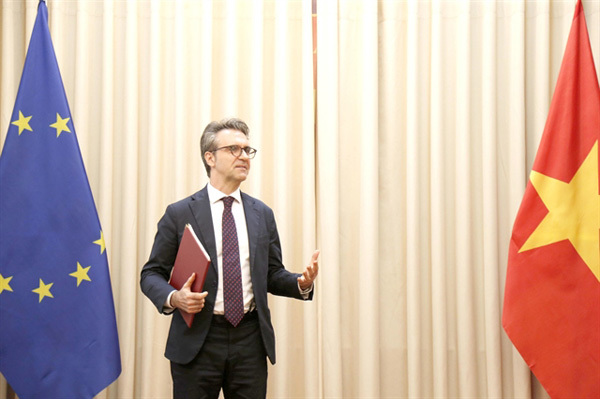Today we can say with confidence and pride that this is a partnership that matters significantly: bilaterally, at regional and at global level – on economic but also, and even more so, on political terms.
 |
| Giorgio Aliberti, EU Ambassador to Vietnam. — VNA/VNS Photo Hoang Viet |
1990 was a momentous year in Europe, with the historic reunification of Germany, which in turn set the stage for the eventual enlargement of the European Union to the 27 member states that we have today, making us the world’s largest trade block, number one donor of international aid and major promoter of international peace and security.
With the launch at the 6th Party Congress (December 1986), Vietnam also embarked on strategic reforms. Thanks to economic reforms from the adoption of the Đổi mới (Renovation) policy in 1986, Vietnam has become one of the region’s fastest-growing economies. In 1990, Vietnam’s per capita GDP was less than $100, while today it is more than US$2,700; total foreign trade was only $5 billion, compared with more than $550 billion today; and EU-Vietnam trade was only less than $200 million, against more than $50 billion USD, according to the latest figures. Vietnam invests in Africa and Latin America. The country contributed for the first time to UN peacekeeping missions in 2014.
The country is also becoming an exporter of wealth: more than 250,000 Vietnamese tourists visit Europe every year. Europe is one of the biggest net receivers of Vietnamese students with more than 15,000 studying in Europe.
Our partnership has developed consequently: At the very beginning, a joint humanitarian programme aimed at re-settling over 100,000 Vietnamese “boat people”; today, development cooperation is still important, with an ongoing portfolio of around EUR 250 million in grants.
With this milestone, by mid-decade (1996), the EU and Vietnam endorsed a framework Cooperation Agreement (FCA) defining the legal foundation of a new partnership. It opened avenues for cooperation beyond humanitarian aid, mainly through the promotion of bilateral trade and investment, the transition to a market economy, support for sustainable economic development and management of natural resources.
And now, after 30 years, our cooperation extends to many important areas such as trade, environment, energy, science and technology, good governance, as well as cultural exchange, migration, the fight against corruption and organized crime, as well as peace and security.
We would not have reached this level of engagement were it not for the commitment of both sides to take the partnership forward and the understanding that it is in our mutual interest to do so.
Indeed, Vietnam has become an attractive partner for the European Union, bilaterally, as well as through its membership of ASEAN and in the UN, where it has shown a clear commitment to multilateralism and the international rules-based order.
It is in this context that last year we signed a Framework Participation Agreement, which is a military-to-military agreement allowing Vietnam to participate in missions and operations under an EU flag. This is the first such agreement signed with an ASEAN country and contributes to the EU’s work in the area of global peace and security.
To get a picture of the phenomenal progress in our relations over the last 30 years, you need only look at our recently launched EU-Vietnam Free Trade Agreement, the first of its kind between the EU and a developing country, to see how far we have come together since those early days.
This agreement has the potential to be a game changer for our relations, and strongly emphasizes our shared conviction that trade is essential to growth, job creation and sustainable development.
The European Union and the international community face numerous challenges today: a more unstable multipolar world, the growing number of fragile states, as well as the risks that come from climate change and resource scarcity.
We celebrate the 30th anniversary of our relations in unprecedented times, where COVID-19 pandemic has transformed the global landscape and created an even more challenging, disunited and potentially dangerous world.
This calls for further strengthening our partnership, on a bilateral and multilateral level, to uphold the international rules-based order and promote peace and prosperity through a sustainable recovery.
The EU stands ready and counts on Vietnam in the partnership to address all these challenges.
Let me conclude by saying that I look back with satisfaction on what we have achieved together in the last 30 years. And I look forward with optimism as we have laid solid foundations for a flourishing partnership ever-growing in substance, width and depth. VNS
*Giorgio Aliberti – EU Ambassador to Vietnam

Europe and Vietnam draw ties together at time of dire need
The overwhelming positive vote of the Vietnamese National Assembly on the EU-Vietnam Free Trade Agreement (EVFTA) and Investment Protection Agreement (EVIPA) confirms the strong Vietnamese commitment

EVFTA to spur Vietnam’s digital transformation
With great advantages and potential, the EU-Vietnam Free Trade Agreement (EVFTA) is expected to spur the digital economy and digital transformation in Vietnam.